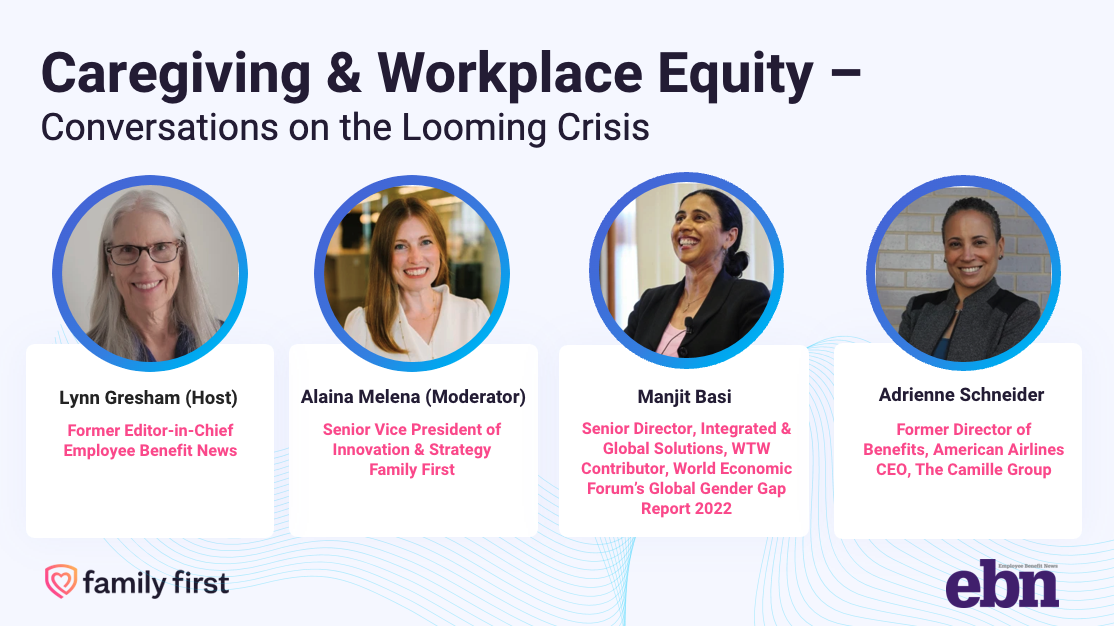The Crucial Role of Employers in Supporting Caregivers & Advancing Workplace Equity
 Imagine a child or adult depending on you to guide them in managing their disability, illness, injury, or difficult life events. How many hours a week might that require? What barriers might you encounter and how would you get assistance? What worries would you have about it impacting your job, career, and income?
Imagine a child or adult depending on you to guide them in managing their disability, illness, injury, or difficult life events. How many hours a week might that require? What barriers might you encounter and how would you get assistance? What worries would you have about it impacting your job, career, and income?
Caregivers often face impossible challenges as they manage work responsibilities and care for loved ones. This balancing act can lead to reduced working hours, career interruptions, and limited opportunities for skill development or advancement. Consequently, caregivers are at risk of earning less over their lifetimes and having poorer health which has long-term implications for well-being and economic security.
Today more than 1 in 5 people in the U.S. act as unpaid caregivers.
Why is supporting caregivers important to workplace equity?
Workplace equity means recognizing and accommodating diverse needs, including those of caregivers, by fostering an inclusive environment where everyone has a chance to succeed. Supporting employees who are caregivers is an essential action towards advancing workplace equity and helps an organization achieve:
- Talent retention and a diverse talent pool
- Gender equality
- Better business outcomes
Supporting caregivers improves employee retention and an organization’s ability to hire diverse talent. A Harvard study revealed that 32% of employees surveyed had voluntarily left a job during their career due to caregiving responsibilities.
Without support, caregivers may face challenges in meeting their work-related goals or opt out of career opportunities, leading to inequities in career development and promotions. AARP reports that approximately 61% of working caregivers have had to adjust their work including arriving late, leaving early or taking time off, reducing work hours, turning down a promotion, receiving a warning about performance or attendance, left a job entirely, or retired early. While these adjustments allow caregivers to manage their roles, they often come at the cost of stalled career advancement and wealth accumulation.
WTW’s Global Wealth Equity Index highlights that caregiving responsibilities often disproportionately fall on women, leading to gender-based disparities in the workplace and substantial wealth gaps compared to both male caregivers and women without caregiving responsibilities. By offering caregiver support employers can help bridge this gap and promote gender and wealth equity.
Caregiver employees bring a unique set of qualities to an organization including leadership, adaptability, empathy, time management, problem-solving abilities, teamwork, and resilience. These qualities can contribute to a more empathetic, supportive, and productive workplace, benefiting work teams and the organization as a whole.
When caregivers receive the support and resources they need from their employer, they are more likely to stay with and build loyalty towards their employer, reducing costs of turnover and reduced productivity, often for key roles within an organization.
What policies and benefits make an impact on caregiver workplace equity?
Policies and benefits caregiver employees identify as valued are:
- Flexible work arrangements and paid time off
- Caregiver-focused resources and expert support
- Inclusive leadership
Flexible work arrangements, paid time off, and caregiver leave can make a significant impact on the lives of caregivers. Flexible work options such as remote work, flexible hours, compressed workweeks, or part-time schedules allow caregivers to better manage their caregiving responsibilities while fulfilling work duties.
According to the National Alliance for Caregiving, caregivers spend an average of 24 hours per week providing unpaid care, emphasizing the need for sufficient time off to manage these responsibilities.
Paid time off options including sick leave, vacation days, personal days, caregiving leave, and bereavement allow caregivers time to attend to their own well-being as well as the needs of their loved ones without losing income.
A growing number of employers are offering caregiver-focused support benefits that provide resources and assistance for the unique challenges that caregivers face. Goldman Sachs Ayco reports implementation of these programs has increased 177% over the last three years. These programs may include access to an expert to review care plans, provide counseling, research, vet and schedule care or daily living providers, as well as research benefits and financial resources to cover services.
These programs may also integrate with other health and well-being benefits such as employee assistance programs (EAP) or other emotional, legal, or financial benefits. The aim of the caregiver benefit is to use experts and technology to uncover the needs of the caregiver, solve barriers they have in access, and ensure high quality and affordable care ultimately reducing time and stress for the caregiver and preventing burnout or need to leave their job.
Identifying caregivers among employees can be a challenge due to privacy concerns, varied caregiving roles, stigma, and fear of negative career repercussions. Organizational leaders can create a safe and confidential environment where caregiver employees feel comfortable asking for support or accommodations. Leaders have demonstrated empathy and successfully set examples by acknowledging caregiving is a significant part of many employees’ lives and by openly sharing their caregiving stories. Leaders who show understanding and flexibility in accommodating caregivers influence the overall culture of equity at the organization.
Supporting employee caregivers is a strategic business decision that benefits employee talent and the organization. Employers play a crucial role in fostering workplace equity by offering flexible work arrangements and paid leave, caregiver support resources and compassionate leadership. By supporting caregivers, employers create a more inclusive and equitable workplace of choice, where all employees can thrive.

